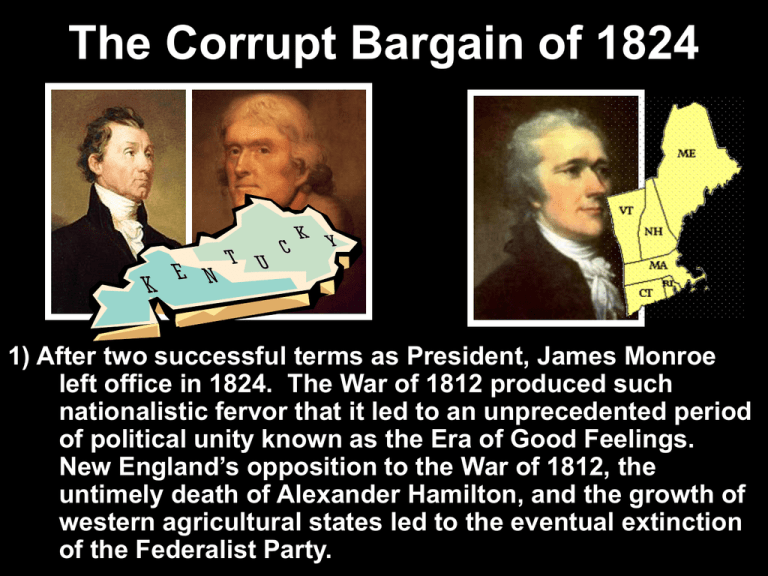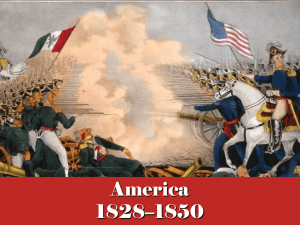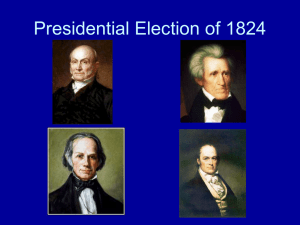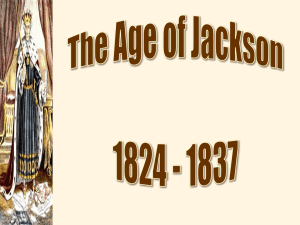The Corrupt Bargain of 1824
advertisement

The Corrupt Bargain of 1824 1) After two successful terms as President, James Monroe left office in 1824. The War of 1812 produced such nationalistic fervor that it led to an unprecedented period of political unity known as the Era of Good Feelings. New England’s opposition to the War of 1812, the untimely death of Alexander Hamilton, and the growth of western agricultural states led to the eventual extinction of the Federalist Party. The Corrupt Bargain of 1824 Adams Clay Crawford Jackson 3) In the election of 1824 there were 4 major candidates = John Quincy Adams of Massachusetts, Henry Clay of Kentucky, William H. Crawford of Georgia, and Andrew Jackson of Tennessee. The Corrupt Bargain of 1824 4) Andrew Jackson’s status as a war-hero naturally made him the popular choice of the people. His campaign against the forces of corruption and aristocratic privilege in government resonated with Western voters in particular. The Corrupt Bargain of 1824 5) Despite Jackson’s popularity, winning a majority in a four-way race proved to be difficult. In the nation-wide popular vote Jackson led the way with 41%, Adams trailed in second with 33%, followed by Crawford with 14%, and Clay with 12%. The Corrupt Bargain of 1824 6) The Constitution mandates that a candidate must receive a majority in the Electoral College in order to become the President. Statewide popular vote tallies determine what candidate is awarded the electoral votes of that particular state. If no candidate achieves a majority of electoral votes, the members of the House of Representatives must vote to determine the winner. The Corrupt Bargain of 1824 7) Henry Clay of Kentucky only received 12% of the popular vote and had little chance of winning the election. However, Clay held a vital position as the Speaker of the House. As a western rival of Andrew Jackson, Clay used his influential position in the House of Representatives to elect John Quincy Adams as President. The Corrupt Bargain of 1824 Adams Clay 8) Despite the appearance of vindictiveness against Jackson, Clay naturally supported Adams because they both favored a stronger national government with an industrial economy. Shortly after Adams was elected, Clay was nominated as the Secretary of State. The Corrupt Bargain of 1824 9) Feeling robbed of the Presidency, Jackson’s supporters immediately declared the ordeal as a “corrupt bargain” between the aristocratic Adams and the scheming Clay. These harsh and vociferous criticisms plagued the Adams administration for the next four years. The Corrupt Bargain of 1824 Ex. – Jackson condemned Clay as “the Judas of the West.” John Randolph of Virginia publicly criticized Clay’s alliance with Adams to the extent that Clay challenged Randolph to a duel. Both missed, but the political battle continued. The Election of 1828 1) For four years John Quincy Adams sought to unite the country under the same nationalistic banner that he had enjoyed as Monroe’s Secretary of State during the Era of Good Feelings. Despite the disputed election, Adams had to deal with growing sectional problems such as the tariff, westward expansion, northern industry, southern slavery, and states’ rights. The Election of 1828 The National Republicans The Democrats 2) Both the Era of Good Feelings and the Age of Jefferson had come to a close by 1824. The election of 1828 revealed a split within Jefferson’s DemocraticRepublican Party. Adams nationalistic views and his focus on foreign policy led him to run as a “National Republican.” Jackson’s campaign against aristocratic privilege and his broad-based appeal among rural western voters led his Party to adopt the name of “Democrats.” The Election of 1828 3) As a candidate from Tennessee, Jackson’s followers presented him as a rough frontiersman that was sympathetic to the concerns of the common man. His reputation as a fierce Indian fighter also made him very popular among western voters. His war-hero status from the Battle of New Orleans also helped him make inroads into northern states. The Election of 1828 5) Political mudslinging and negative campaigning reached new lows during the election. Adams’ men tried to characterize Jackson as an illiterate and uneducated military extremist. Without Adams knowledge, his supporters launched nasty personal attacks against Jackson by accusing his mother of being a prostitute and his wife an adulteress. The Election of 1828 6) Jackson’s wife Rachel was already in poor heath and she died a month after the election. Jackson believed that the personal attacks against her character worsened her already fragile state and caused her death. Jackson personally blamed Adams for the loss of his wife and he never forgave him. The Election of 1828 8) Given the appearance of a “Corrupt Bargain” in 1824 combined with the frustrations of the Adams administration, Jackson was almost handed victory in 1828. However, several transformations in the American political system also helped ensure a Jackson victory. The Election of 1828 9) During the 1820s many states did away with the property-owning requirement for voting. A dramatic increase in voter eligibility greatly diminished the political influence of the wealthy aristocracy. The introduction of Universal White Male Suffrage marked incredible transformations in American politics. The Election of 1828 A) The number of voters in the election of 1828 was twice that of 1824. Jackson’s common-man appeal certainly made him popular among this new class of voters B) The Jacksonian Era marked a dramatic transformation in American politics. The sudden surge in political participation forced politicians In an effort to appeal to the common-man, politicians were forced develop grassroots campaigns that sought the inclusion of all Americans.









